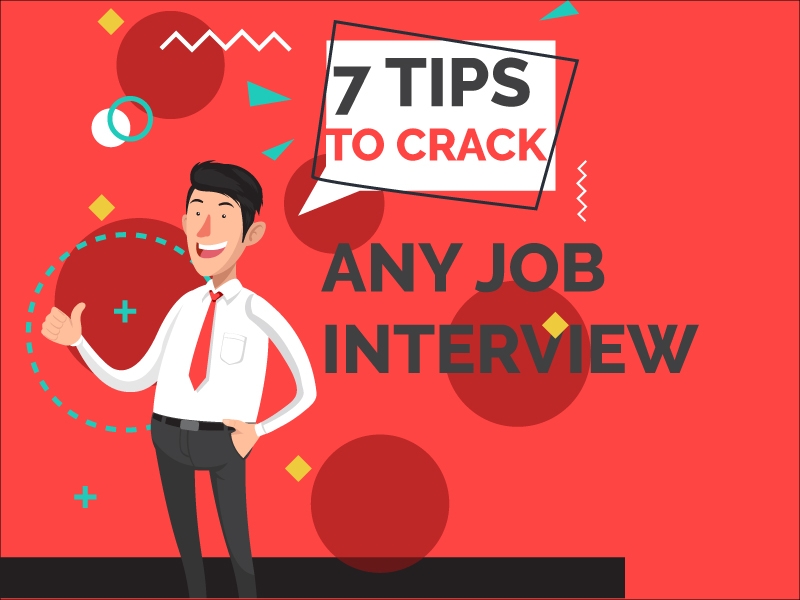Yes, I am Claiming that the 7 tips that I am going to cover will help you crack any job interview. The only thing that prevents someone from qualifying in a job interview is the interviewee himself. If you follow the tips given here with sincerity, there is no reason you are not going to crack the job interview.
Here, I am not going to cover the topics like dress well, prepare well and so on. These are not tips in my humble opinion but these are a common knowledge and we all know about it. What I am going to cover is how a well-trained interviewer would question you and how you should prepare yourself to maximize your chances of getting your dream job.
1. KNOW THE COMPANY AND INTERVIEWER BEFORE YOU CAN CRACK ANY JOB INTERVIEW
This also falls into the domain of universal knowledge but I am going to help you to prepare this stage well. When you get an interview call, there are certain things you must know about the company where you aspire to work.
- Go to the company website and read when did the company start, the founders, and stakeholders, major turning points in the organization’s history like mergers and acquisition. Product or solutions there offer is also to be read comprehensively.
- In google type the name of the company and click the news section in google or any other search engine you are using. Skim through any latest news that you can read. It can sometimes be a very powerful tool in your hands if you know what is currently happening in the company
- Go to LinkedIn and search for the person who is going to interview you. Look for common contacts and try to gain as much insight into the person as you can. If a recruiter does not initially reveal who is going to interview you then, you must ask who you are going to meet, it’s your right to know, after all, you are taking out your time and traveling to meet a person.
- You can also look for mutual connections who work at the company and seek his individual feedback about the company and work culture.
2. COLLECTING EVIDENCE AND EXAMPLES FROM YOUR CURRENT OR PAST PROFESSIONAL EXPERIENCES TO GIVE WEIGHT TO YOUR INTERVIEW ANSWERS
It is a very critical exercise. Most competency based interviewing involves seeking evidence from your current or past professional experiences to establish the claims that you make during the interview. I can bet an experienced interview can immediately understand that you are making it up if you are not well prepared. Therefore, Prepare a set of incidents for your interview. If you want a list I am going to provide you with some of them and further you can also add a few more. I will come to the point why it is required.
Some of the must prepare evidence examples from your present or past work experience
- The best moment of your professional career
- The worst moment of your professional career
- The moments when you failed and the moments when you succeeded in your job role
- Strengths and Weaknesses
- Achievements in a similar role or task that you are currently applying for
- Why you think you are the right match for this job
- Why should the company not hire you
If for example, an interviewer asks you to list down your strength and weaknesses, it is almost always an easy and instant answer for us. however, things drastically change when they ask to give instances from your professional experience when you came to the realization that you have these strengths and/ or weaknesses.
And there you go, most of the candidates are not even half that prompt in their replies in comparison to the claim about their strengths and weaknesses they just made.
In fact, this is applicable to many other questions that the interviewer may ask you. I am not telling you to make up stories about your professional experiences. What I am suggesting is that you should be prepared with some major events in your past and present professional experiences which can enable you to handle these questions with ease.
Let us look at an example
[su_box title=”Q: What is your biggest weakness that’s really a weakness, and not a secret strength?” box_color=”#ea3838″] A: I have a weakness that I am extremely impatient sometimes. I expect my employees to prove themselves on the very first assignment. However, If they fail, my tendency is to stop delegating to them and start doing everything myself. To compensate for my own weakness, however, I have started to really prep my people on exactly what will be expected of them.[/su_box]
In this example, if you see, the candidate has not only given the weakness but also elaborated on with an example. You can also give specific evidence by mentioning the real-life incident to further show that you know what you are talking about.
If you observed closely you could see how the candidate also cleverly mentions that he or she is working on the weakness by prepping people to what is expected of them so that they do not fail in the first assignment itself. Therefore every answer must show a positive way ahead or working on the solution
3. ALWAYS REMEMBER THAT INTERVIEW IS A TWO WAY PROCESS
No matter how desperately you think you need the job or how long have you been waiting for this one interview call, it is still a fact that a job interview is a two-way process. Both the candidate and the company are evaluating where they are the right fitment for each other. Both parties have equal right to accept and refuse the proposition.
Carry this message along with you when you go for the interview. This will reflect in your body language and trust me without it sometimes the desperation for the job does reflect in your body language. Whenever you feel like you are going into the desperation zone, just remember, an interview is a two-way process. You are not only here to quality or crack the interview but also to evaluate whether you will work with this company or not.
You May Also Like
[pt_view id=”1c9241824f”]
4. DO NOT HESITATE TO ASK QUESTIONS BUT DO NOT INTERRUPT IN BETWEEN
Most of the times the interviewer will give you a chance to ask for any question that you may wish to ask. Now look at it this way, you are going to purchase an item you so desperately wanted to purchase for a long time. would you not be curious enough to ask questions about the product, its warranty, service, maintenance and so forth? The answer is you would definitely have some questions.
Likewise, it is highly unlikely that when you are making such an important career and life decision, and you will not have many questions to ask. However do not just ask for the sake of asking. It should be a genuine question based on your curiosity and any conversation that you have during the interview. My recommendation is not to prepare the question beforehand but ask questions related to what the interviewer has been talking to you about. And do not hesitate to seek clarity or ask questions when you are not clear about anything that the interviewer is talking about. But make sure you let him or her complete first and ask gently.
5. THE IMPORTANCE OF UNEXPECTED ANSWERS IN ANY JOB INTERVIEW
An interviewer asked a candidate: What would you do if we do not hire you?
The interviewer was expecting answers like “I will look into what improvement can I make and reapply for the position” or ” I will upgrade my skills and then again apply for the position because I really aspire to get this job role”.
However, a candidate replied that “I will move on with a thought that the organization and I have missed a potential opportunity for mutual benefit and growth”. However, I am sure the same will not hinder both our prospects for growth and betterment.
An unexpected answer is a risky yet powerful tool in your hands. You have a chance to make an impact during the interviewer and also a risk that you may sound arrogant, offending, or sometimes even weird in your response. If you can execute it by being yourself and not being offending then you must at least once use it during the interview. However only if you can handle it.
6. FIND A REASON TO ADMIT THAT YOU NEEDED TO DO MORE
It is fact that companies are looking for individuals who keep on learning and upgrading their skills. If you can find a reason to admit that there are things you will learn or skills that you would upgrade, that has been observed to have a very positive impact on your candidature.
7. RULE OF THREE SECONDS AND POWER OF SILENCE IN JOB INTERVIEWS
It is a normal tendency for a candidate to speak more when something comes up during the interview that the candidate knows very well, has expertise on, or is comfortable speaking about. But the best approach is to maintain consistency throughout the job interview. Any change in the enthusiasm with which you speak a lot about one subject and something you speak less or with less vigor gives a clear indication that you know a subject or you don’t know the other one.
The best way is to answer a specific question in short and simple words then maintain a silence for the interviewer to further speak. Also, I recommend practicing a pause of 3 seconds after the interviewer has finished asking the question and you begin answering. There are two advantages to this approach
- You get enough time to think and answer
- You maintain consistency in the way you answer- not too eagerly to things you know and vice versa







